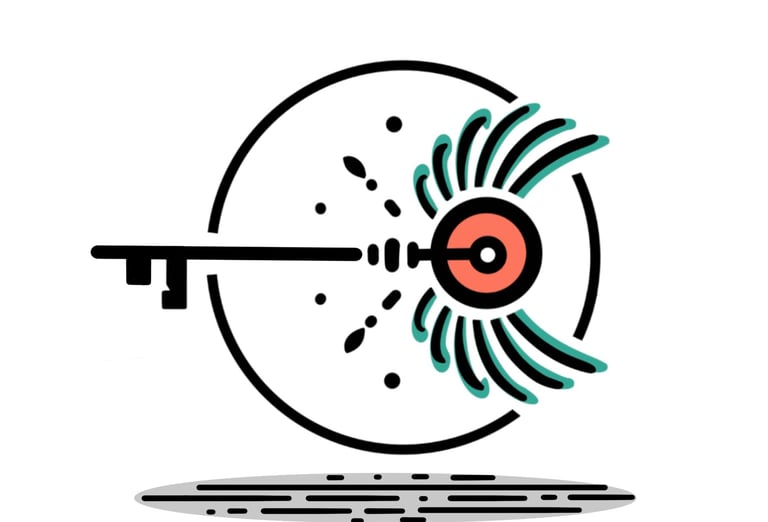Key to learning a foreign language
So, have we found the magic trick yet?
1/25/2025


Have We Found the Magic Trick to Learning a Language Yet?
There’s no magic trick (duh!) - and and it's all just plain hard work.
No, not really. Just kidding. Stay with me.
When you google how to learn a new language, you'll get flooded with tools, methods, courses, apps, and AI-generated advice (so, really, no research necessary).
But here’s the deal: there’s no magic method, program, or shortcut that will do the work for you.
If I asked you right now how to learn a foreign language, or advise me what I need to do - you’d probably come up with several solid tips. Because, honestly - it’s not rocket science. But is it that simple?
In my mind it’s a challenge of the kind of losing weight, getting fit, eating healthy, or saving money. We usually have a pretty good idea (or some idea, at least) about the good things that generally help us:
If you want to be fit, you move your body more.
If you want to eat healthy, you eat your veggies.
If you want to save money, start with comparing your income with expenses.
If you want to learn a language, you practice using it.
And deep down we also know what's not great, necessary, nor very effective:
Studying only from textbooks.
Buying an expensive gym membership (and never going!) - a spending and fitness fail.
Eating glazed doughnuts with rainbow sprinkles at 2 a.m.
The Trap of Comparison
It doesn't help that we constantly see success stories everywhere, all these people around us (okay, on social media) who found the right method, the perfect path, the ideal routine. We see them thriving, doing what we want to do, reaching the levels we dream of. They must have a natural talent, or some effortless knack for success. And of course, they must be better than us, right?
Except… that’s hardly the whole truth.
Even when we follow real people doing real things (not stepping into the artificial influencer fantasy universe), we only see the polished results, the tip of the iceberg, not all the struggle underneath. And we rarely see their failures. It helps to be reminded of that.
Just like it does absolutely nothing for us to think we’re worse than anyone else just because we’re not there yet.
We’re not at the same skill level. We don’t fit the same mold.
And to be perfectly clear - I'm the one who needs to hear this more often than anyone. Maybe I should build myself a little pep-talk machine, like Simone Giertz’s “Proud Parent Machine,” whispering: "Don’t compare yourself to others. You’re good enough. You got this. Love you."
The Hardest Part: Doing the Hard Thing
A lot of this comes down to how we’re wired.
Learning foreign languages - like working out, eating healthy, or any other life endeavor - is full of quitting and starting over. Full of feeling like we suck at the thing. Feeling like we suck at learning at all.
We don’t want to do the hard things. We don’t want to step out of our comfort zone. We want someone else to tell us what to do.
And when we don’t have a school, a class, or an exam to force us (as if that ever helped anyone, really)? We start looking for something else to rely on - some system, some guide, some structure that makes sense.
It might not be rocket science, but let’s be honest - it’s not easy either.
How do you learn?
The real key? We all learn differently.
Not everything that works for someone else will work for you. You might keep trying and failing simply because you’re aiming for the wrong thing.
People crave vastly different things when it comes to learning:
Structure.
Freedom.
Discipline.
Motivation.
Focus.
Distraction.
Rules.
Inspiration.
An expensive course.
Freebies.
Variety.
Simplicity.
Small steps.
A robust plan.
A fish in our ear so we don’t have to learn at all.
Magic tricks and quick solutions.
But those aren't always available, or reasonable. That’s why, in my own experience, I always start with one question:
What do I actually want?
I pause and think about my motivation, my fears, my interests, my habits, my conditions. These are my building blocks. And as a teacher, I did the same with my students.
Because real success in language learning happens when…
We enjoy the process.
We see our progress.
We use our skills to do things we couldn’t do before.
Our new abilities open new doors.
We feel curious and hungry to discover more.
Our goals push us forward just enough to keep going.
We have buddies to share the journey with.
And then there's of course the three P's of succeeding at anything (it's Practice, Practice, Practice)
But as someone who can’t stop learning (but is also a world-class procrastinator), I’ve realized what we often lack is the big picture.
A map that shows us:
Where we are.
How far we’ve come.
Where we’re headed.
And how to get there.
Questions to Think About
What do you actually want from language learning - structure, freedom, fun, progress?
Have you been following someone else’s “perfect” method instead of finding what works for you?
What’s one thing you know you should do, but haven’t been doing?
What makes you feel excited to learn?
If you had a “language learning map,” where would you place yourself right now?
Let's connect
© 2026. All rights reserved.
Message me
All this content I create is available to you for free. There are no affiliate links, sponsorships, or ads.
Have you learned something?
